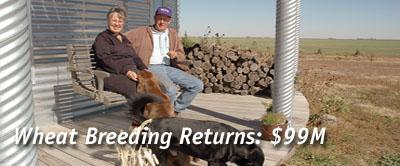Wheat Breeding Returns $99 Million Each Year to Producers

Louise and Vance Ehmke, Dighton, depend on K-State wheat varieties to help them stay competitive in the agricutlure market.
Wheat is used to make bread, bed down stalls, and serve as an element in many household items, including plastic bags, postage stamps, and golf tees.
Without a doubt, wheat serves countless purposes in our daily lives.
But for more than 24,000 Kansas producers and their families, wheat has an even greater purpose: It’s a living.
"There’s very stiff competition in production agriculture," said Vance Ehmke, producer in Dighton, Kan. "You’ve got to be constantly using wheats that have the most profit potential."
Fortunately, producers like Ehmke aren’t at it alone. K-State’s wheat breeding program works year round to develop higher yielding, more resistant varieties available to the public.
According to a recent study led by agricultural economist Andrew Barkley, this research has been increasing Kansas producer revenues by about $99 million annually since 1977. The varieties developed by K-State are paying off for the producers.
"For a wheat farmer in Kansas, the
K-State program is invaluable," said Jeff Bahr, a no-till producer and share cropper in Barber County, Kan.
K-State’s wheat breeding program began in1874, followed by the establishment of a selection program in 1906. K-State’s first improved variety, Kanred, was released in 1917. Currently, more than 1,000 crosses are performed each year throughout the state.
In recent years, the K-State improved varieties have been planted to nearly three-fourths of the total Kansas wheat acres in production.
By offering the varieties publicly and regularly introducing new crosses,
K-State is giving Kansas wheat producers the helping hand they need, Bahr said.
"It’s paramount that we have a wheat breeding program," he said. "Somebody has to do it, and that’s where K-State’s program is filling a niche nobody else would. Every few years, when a new wheat is released, I’m ready for it."
Ehmke agreed.
"K-State has really, over the years, distinguished itself as a mover and a shaker."
But the most important impact of the wheat breeding program for Ehmke is the overall economic development it initiates in Kansas communities. By investing in the research needed to keep wheat varieties producing well and adapted to Kansas climate and disease, K-State is contributing to the survival of the family farm, he said.
"You are creating something that allows farmers to increase their net income, remain competitive, and stay on the farm," Ehmke said. "With these new K-State varieties, if you’re making more money, it increases the possibility you can get one of the kids involved in the operation and keep agriculture going."
Ehmke also sees a continued focus on research as a potential solution to greater economic strain on agriculture, much of which is being addressed with federal aid.
"Rather than having individuals supported federally, we’d rather be doing this on our own with better yielding varieties," he said. "K-State plays a role in getting us in that direction."
Still, for producers like Bahr and Ehmke, it is simply a comfort knowing they have a partner in K-State.
"We owe a great deal to them for their participation in this," Ehmke said. "Every day you wake up you’ve got to run hard, and it sure is nice having
K-State on your team."
Joe Martin
785-625-3425, X213
jmartin@k-state.edu
Allan Fritz
785-532-7245
akf@k-state.edu
Wheat May Fight Cancer
A research partnership between three K-State Research and Extension departments and researchers at Wichita State University and the University of Missouri studied plant-based - or phyto - estrogens called lignans and other antioxidants in wheat bran that appear to suppress cancer in the colon.
Ron Madl
785-532-7022
Enhancing Soybean Production
Genetic improvements of soybean varieties in Kansas increases farm revenue by more than $3 million per year. Genetic improvement of soybean varieties in Kansas increases yields by about .2 bushels per acre per year and farm revenue by more than $3 million per year.
Bill Schapaugh
785-532-7242
Resources to the World
The Wheat Genetic and Genomic Resources Center stores stocks of wild wheats and wheat-related grasses that help breeders worldwide preserve and improve varieties. Some of the center's accomplishments include releasing 47 improved germplasms, training more than three dozen visiting scientists and students, and leading efforts on gene sequencing.
Bikram Gill
785-532-1391